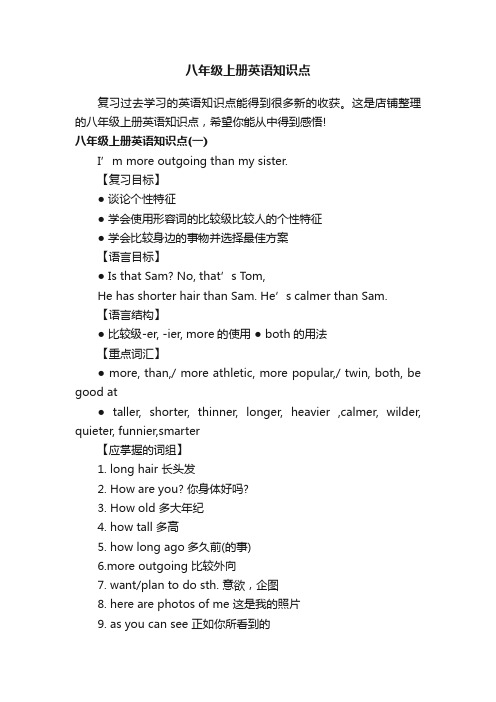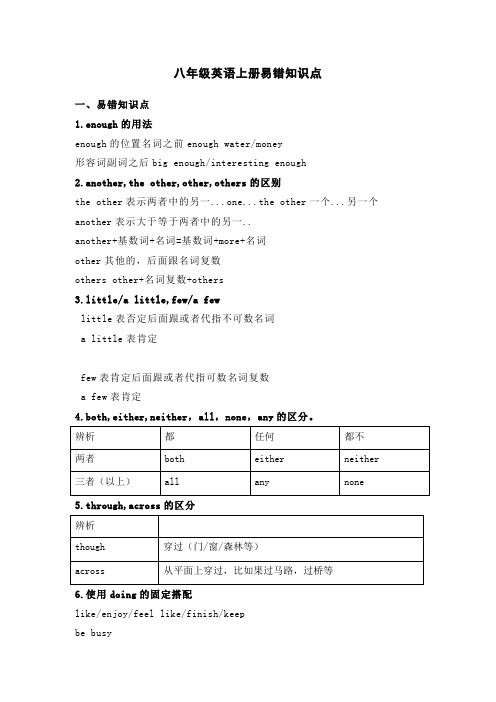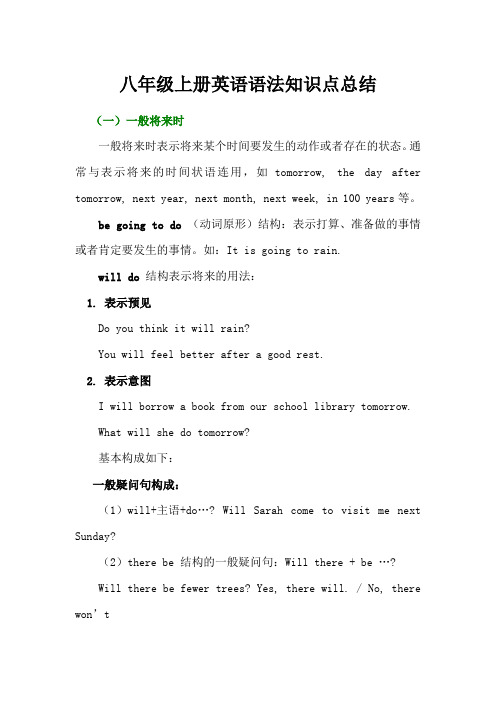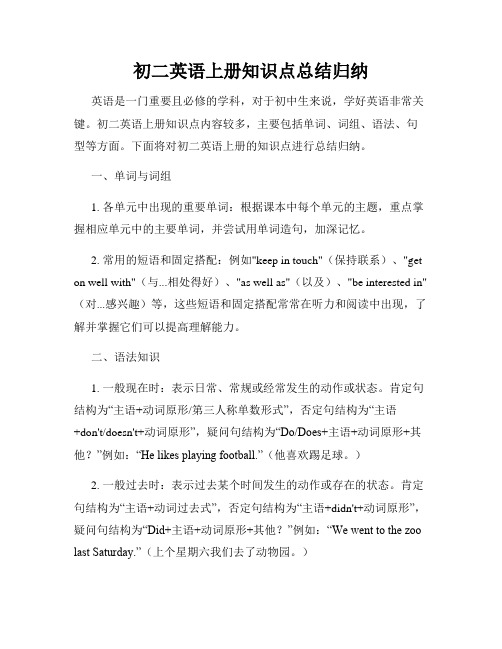初二英语上册知识点
初二上册英语知识点总结归纳

初二上册英语知识点总结归纳英语在考试占据重要分值,不管是初中还是高中都是必考科目,所以学好英语是很有必要的。
下面是店铺分享给大家的初二上册英语知识点总结,希望大家喜欢!初二上册英语知识点总结一1.参加take part in/be in/ join in+活动参加活动 takepart in the long jumpjoin the school rowing club加入组织be/play for/against sth支持/反对某人 /某事效力They both play for the HoustonRockets in the NBA. 反义词play againt对阵2.花费人+spend some time/money onsth/in doing sth花费时间或者金钱在某事上/做某事人+pay some money for sth物+cost/ take help sb (to) dosomething=do sb. a favor=give sb a hand3.到达reach/ get to/arrive in/at+地点, in为大地点,inBeijing, at为小地点 at home4.著名be famous for Chinais famous for the Great Wall. 因。
而闻名be famous as Chongqingis famous as the Moutain City.称之为,美誉5.like动词喜欢feellike doing sth 喜欢做某事like介词像looklike看起来像 sound like听起来像 smell like闻起来像,taste like尝起来像.6.看look look up a word in adictionary查单词look like看起来像,look at看一看, look for寻找, look over检查, look after7.借I can lend you some tapes ofher songs. 主语借出We often borrow books from thelibrary.主语借进Can I borrow your bike?我能借你的自行车吗?=Can you lend me your bike?=Can you lend your bike to me? 你可以借你的车给我吗?8.照顾动词carefor the patients 照顾病人,名词take care of sb/oneself,形容词Becareful当心(反)careless9. 猜测Collecting stamps must begreat fun. 收集邮票想必很有趣。
八年级上册英语知识点

八年级上册英语知识点复习过去学习的英语知识点能得到很多新的收获。
这是店铺整理的八年级上册英语知识点,希望你能从中得到感悟!八年级上册英语知识点(一)I’m more outgoing than my sister.【复习目标】● 谈论个性特征● 学会使用形容词的比较级比较人的个性特征● 学会比较身边的事物并选择最佳方案【语言目标】● Is that Sam? No, that’s Tom,He has shorter hair than Sam. He’s calmer than Sam.【语言结构】● 比较级-er, -ier, more的使用● both的用法【重点词汇】● more, than,/ more athletic, more popular,/ twin, both, be good at● taller, shorter, thinner, longer, heavier ,calmer, wilder, quieter, funnier,smarter【应掌握的词组】1. long hair 长头发2. How are you? 你身体好吗?3. How old 多大年纪4. how tall 多高5. how long ago多久前(的事)6.more outgoing 比较外向7. want/plan to do sth. 意欲,企图8. here are photos of me 这是我的照片9. as you can see 正如你所看到的10. in some ways在某些地方11. we look the same我们看起来一样, They look different他们看起来不同12. the same to ……多……是一样的13. quite the same 完全一样14. all the same 还是,同样应……15. look like 看起来像….一样,而look the same看起来很像16. go to lots of parties经常参加聚会=often go to the party17. a little taller 高一点18. take sth. from sth. 从某处拿/取出某物19. put sth. in sth. 将某物放入某物中20. make a list of 列出清单21. has cool clothes 有漂亮的衣服22. is popular in school 在学校受欢迎23. is good at sports 擅长体育24. make me laugh 使我发笑25. that’s not very important for me 那对我来说并不重要( be important for sb.)26. put up举起,抬起,挂起,张贴,建造;put on穿上,戴上,上演(戏剧);put down=write down=copy down 写下来; put out 伸出,扑灭;put away 收起来,收好;put off推迟;put one’s heart into…全神贯注于……,全身心投入……27. opposite views 相反的观点28. a weekendteacher 周末教师29. Abacus Study Center 珠算研究中心30. elementary school students 小学生31. be good with children 善于与孩子相处32. have good grades 成绩出色33. enjoy telling jokes 喜欢讲笑话34. can’t stop talking 不能停止讲话35. help others 帮助别人,help each other互相帮助36. in one’s free time在业余时间37. one of +复数名词(代词)……其中之一38. use sth. to do sth.=do sth.. with sth. 使用…做…39. be/feel sorry for sb. 为某事感到同情或难受;be / feel sorry for sth. 因某事感到抱歉或后悔;be sorry +to see/hear 听到或看到某种情况很不安或难过;say sorry to sb.向某人道歉40. begin with 从……开始41. next to 在……旁边,紧靠……42. be famous for 因… 而著名,因……而广为人知; be famous as 作为……而知名43. all together 总计,总共44. make sb. do sth. 让/使某人做某事,相似的用法有几个感官动词see, let, hear, watch, feel等【应该掌握的句子】1.What are you doing for vacation? I’m babysitting my sister.假期你要做什么?我要照顾我的妹妹。
八年级上册英语必考点

八年级上册英语必考点
以下是八年级上册英语必考点:
1.时态:包括一般现在时、一般过去时、一般将来时以及现在进
行时等。
2.数词:包括基数词和序数词的用法。
3.代词:包括人称代词、物主代词、反身代词和指示代词的用法。
4.名词:包括可数名词和不可数名词的用法,以及单数形式和复
数形式的转换。
5.动词:包括及物动词和不及物动词的用法,以及动词的时态和
语态的转换。
6.形容词和副词:包括形容词和副词的比较级和最高级的用法。
7.冠词:包括定冠词和不定冠词的用法。
8.介词:包括表示时间、地点、方向和方式等的常用介词的用法。
9.疑问句和陈述句的转换:包括疑问词的使用和疑问句的构成。
10.宾语从句和定语从句:包括宾语从句和定语从句的引导词和构成。
11.情态动词:包括can、could、may、might、must、shall、should、will、would、have to和need的用法。
12.倒装句:包括将助动词、情态动词或系动词放在主语之前的构成和使用。
13.同义词和反义词:包括常见的同义词和反义词的词汇搭配和用法。
以上是八年级上册英语必考点的一些内容,具体还需根据教材内容和学校要求进行复习。
八年级英语上册易错知识点

八年级英语上册易错知识点一、易错知识点1.enough的用法enough的位置名词之前enough water/money形容词副词之后big enough/interesting enough2.another,the other,other,others的区别the other表示两者中的另一...one...the other一个...另一个another表示大于等于两者中的另一..another+基数词+名词=基数词+more+名词other其他的,后面跟名词复数others other+名词复数+others3.little/a little,few/a fewlittle表否定后面跟或者代指不可数名词a little表肯定few表肯定后面跟或者代指可数名词复数a few表肯定4.both,either,neither,all,none,any的区分。
5.through,across的区分6.使用doing的固定搭配like/enjoy/feel like/finish/keepbe busybe used to/look forward to+doing介词后7.使用do的固定搭配情态动词had betterdo/does/diddon’t/doesn’t/didn’t+domake/let sb8.形容词副词的位置形容词①修饰名词或者代词,作定语;(注意;名词之前,复合不定代词之后)an interesting novel;something important.②在系动词之后,作表语(系动词包括感官动词,be动词以及一些半动词)Smell good/keep healthy/seem unhappy③在宾语之后,作宾语补主语。
find/make/believe+宾语+形容词副词①修饰形容词/副词(一般在形容词副词前)She is really talented in skiing.②修饰动词(在be动词/情态动词之后,实义动词之前)He can also finish the match.I often go swimming once a week.③修饰句子Luckily,he didn’t hurt himself badly.9.形容词副词原级,比较级和最高级的区分以及同义句转换、原级比较结构:①A+谓语动词+as+adj/adj.原形+as+B②A+谓语动词(否定)+so/as+adj/adj.原形+as+B比较级结构:①A+谓语动词+adj/adj.比较级than+B②much/far/even/a lot等修饰比较级③比较级+and+比较级④The+比较级(+主谓),the+比较级(+主谓).越...就越...⑤Which+谓语动词+比较级,A or B?最高级结构①one of+the+形容词最高级+名词复数②The+序数词+最高级③Which+谓语动词+最高级,A、B or C?④形容词最高级前必须加the.同义句转换①She is not as tall as Lily.=she is shorter than Lily=Lily is taller than she/her.②She is the best student in her class=She is better than any other student in her class=She is better than the other students in her class10.感叹句what/how的结构辨别What a/an+形容词+可数名词的单数(+主语+谓语)!What+形容词+不可数名词/可数名词的复数(+主语+谓语)!How+形容词+a/an+可数名词的单数(+主语+谓语)!How+形容词/副词原形(+主语+谓语)!How+主语+谓语!11.So/such...that结构辨别so++形容词+a/an+可数名词的单数+that+句子so++形容词/副词原形+that+句子so++many/much/little/few+可数名词的复数/不可数名词+that+句子such++a/an+形容词+可数名词的单数+that+句子such++除many/much/little/few外的形容词+可数名词的复数/不可数名词+that+句子12.There be结构与used to do的结合There be there used be这儿过去有/是...used to do13.There be结构与一般将来时饿结合There bewill do there will be这儿将会有/是...There bebe going to do there is/are going to be这儿将会有/是...14.主将从现的用法主句用一般将来时,从句用一般现在时适用这一用法的连接词:if如果,unless如果不;除非;when当..时候;as soon as一...就as long as只要(连词引导的句子叫从句)If it doesn’t rain tomorrow,we will go out to ride bikes.注意:若if的意思为是否时,那么时态就不是主将从现,而是根据时间状语来判断。
八年级上册英语语法知识点总结

八年级上册英语语法知识点总结(一)一般将来时一般将来时表示将来某个时间要发生的动作或者存在的状态。
通常与表示将来的时间状语连用,如tomorrow, the day after tomorrow, next year, next month, next week, in 100 years等。
be going to do(动词原形)结构:表示打算、准备做的事情或者肯定要发生的事情。
如:It is going to rain.will do结构表示将来的用法:1. 表示预见Do you think it will rain?You will feel better after a good rest.2. 表示意图I will borrow a book from our school library tomorrow. What will she do tomorrow?基本构成如下:一般疑问句构成:(1)will+主语+do…? Will Sarah come to visit me next Sunday?(2)there be 结构的一般疑问句:Will there + be …?Will there be fewer trees? Yes, there will. / No, there won’t否定句构成:will + not (won’t)+doSarah won’t come to visit me next Sunday.特殊疑问句构成:特殊疑问词+will+主语+…?What will Sarah do next Sunday?练一练根据例句,用will改写下列各句例:I don’t feel well today. (be better tomorrow)I’ll be better tomorrow.1. Gina has six classes today. (have a lot of homework tonight)_____________________________2. I’m tired now. (sleep later)_____________________________3. My parents need a new car. (buy one soon)_____________________________4. We can’t leave right now. (leave a little later)_____________________________5. The weather is awful today. (be better tomorrow)_____________________________答案:1. She’ll have a lot of homework tonight.2. I’ll sleep later.3. They’ll buy one soon.4. We’ll leave a little later.5. Maybe it’ll be better tomorrow.(二)should的用法:should用来提出建议和忠告,后边加动词原形,否定句直接在should后边加not.例如:I think you should eat less junk food.我认为你应该少吃垃圾食品。
初二英语上册知识点总结(人教版)

初二英语上册知识点总结(人教版)1. 语法知识点- 一般现在时:表示经常性或惯性的动作、状态或客观真理。
- 一般过去时:表示过去发生的动作或存在的状态。
- 现在进行时:表示现在正在进行的动作。
- 一般将来时:表示将来将要发生的动作或存在的状态。
- 定语从句:用来修饰名词或代词的从句。
- 状语从句:用来表示时间、地点、原因、条件或目的等的从句。
- 直接引语和间接引语的转换:将直接引语转化成间接引语需要考虑时态、人称、时间、地点等问题。
2. 词汇与短语- 常用动词短语:例如,look forward to, take part in, give up等。
- 时间短语:例如,in the morning, at night, on weekends等。
- 形容词与副词:例如,beautiful, quickly, slowly等。
- 连词与介词:例如,but, and, in, on等。
3. 句型结构- 主语 + 谓语:例如,Tom studies English.- 主语 + 不及物动词 + 状语:例如,He runs quickly.- 主语 + 系动词 + 表语:例如,She is beautiful.- 主语 + 及物动词 + 宾语:例如,I eat an apple.4. 阅读技巧- 理解词义:通过上下文判断单词的意思。
- 掌握关键信息:抓住文章中的重要信息。
- 推测逻辑关系:通过逻辑推理理解段落和篇章的结构。
- 注意细节问题:注意文章中的细节信息。
5. 听力技巧- 提前预测:在听对话或短文之前,先预测可能会涉及的内容。
- 注意语境:在听时将听到的语句与前后语境联系起来理解。
- 注意听力焦点:抓住关键词汇、数字和特别强调的内容。
以上是初二英语上册知识点的简单总结,希望对你有帮助!。
初二英语上册第一单元知识点

初二英语上册第一单元知识点(一)1. name’s=name is 名字是2. I’m=I am 我是3. she’s=she is 她是he’s=he is 他是you’re =you are 你(你们)是they’re=they are 他(她;它)们是that’s=that is 那是isn’t=is not 不是(单数形式)he’s not =he is not=he isn’t 他不是what’s=what is 什么是where’s=wher e is 在哪儿是Let’s=Let us 让我们4 .Nice to meet/ see you. 见到你很高兴5 .how many + n(可数名词复数) 多少how much + n.(不可数名词) 多少6. family name 姓氏7. given name 名字8 .telephone number =phone number 电话号码9. ID card 身份证10. Good morning 早上好11. Good afternoon 下午好12. Good evening . 晚上好Good night.晚安13. Sit down, please. =Have a seat, please. 请坐14. That’s all right. 好;行;不用谢;没关系That’s right . 对的、正确的 All right .好的,行,好吧15. Not at all.=It’s a/my pleasure =That’s OK. =You’re welcome. =That’s all right. 不用谢初二英语上册第一单元知识点(二)1. What’s your name? 你叫什么名字?My name’s Jenny. / I’m Jenny. / Jenny.May I have your name?Yes, my name’s Jenny.What’s her / his name? 她 / 他叫什么名字?His/Her name’s Tony/Gina.2. What’s your first / given name?你的名是什么?(对于外国人来说,中国人相反)What’s your last / family name?你姓什么?What’s your full name?My full name/ It is Tony Brown.My first name is Tony.My last name/family name is Brown.3. I’m Mary. = My name is Mary. 我叫玛丽。
初二英语上册知识点总结归纳

初二英语上册知识点总结归纳英语是一门重要且必修的学科,对于初中生来说,学好英语非常关键。
初二英语上册知识点内容较多,主要包括单词、词组、语法、句型等方面。
下面将对初二英语上册的知识点进行总结归纳。
一、单词与词组1. 各单元中出现的重要单词:根据课本中每个单元的主题,重点掌握相应单元中的主要单词,并尝试用单词造句,加深记忆。
2. 常用的短语和固定搭配:例如"keep in touch"(保持联系)、"get on well with"(与...相处得好)、"as well as"(以及)、"be interested in"(对...感兴趣)等,这些短语和固定搭配常常在听力和阅读中出现,了解并掌握它们可以提高理解能力。
二、语法知识1. 一般现在时:表示日常、常规或经常发生的动作或状态。
肯定句结构为“主语+动词原形/第三人称单数形式”,否定句结构为“主语+don't/doesn't+动词原形”,疑问句结构为“Do/Does+主语+动词原形+其他?”例如:“He likes playing football.”(他喜欢踢足球。
)2. 一般过去时:表示过去某个时间发生的动作或存在的状态。
肯定句结构为“主语+动词过去式”,否定句结构为“主语+didn't+动词原形”,疑问句结构为“Did+主语+动词原形+其他?”例如:“We went to the zoo last Saturday.”(上个星期六我们去了动物园。
)3. 现在进行时:表示现在正在进行的动作。
结构为“主语+am/is/are+动词-ing”。
例如:“She is watching TV now.”(她正在看电视。
)4. 情态动词:如can、could、may、might、must等,用于表示能力、请求、允许、推测等。
例如:“You m ust finish your homework before dinner.”(晚饭前你必须完成你的作业。
- 1、下载文档前请自行甄别文档内容的完整性,平台不提供额外的编辑、内容补充、找答案等附加服务。
- 2、"仅部分预览"的文档,不可在线预览部分如存在完整性等问题,可反馈申请退款(可完整预览的文档不适用该条件!)。
- 3、如文档侵犯您的权益,请联系客服反馈,我们会尽快为您处理(人工客服工作时间:9:00-18:30)。
初二英语上册知识点(短语、句型)MODULE11、如有always ,often, usually, sometimes, seldom, never, once a....,every...用一般现在时,第一、二人称复数后跟动词原形,第三人称单数后跟动词加's'/'es'。
2、如有now ,look! ,listen, at the moment ....用现在进行时,结构是be (am, is, are) +v-ing3、如有tomorrow, the day after tomorrow, from now on, in +一段时间, some day, next....用一般将来时,结构:will + v原\ be going to +v原(没有动词用be )4、如有yesterday, ......ago , last....just now.....用一般过去时动词加edgive sb. Sth.=give sth. to sb. 给某人某物every day每天,write down 写下,记下write it (them) down everyday每天的,日常的,how about doing sth.=what about doing sth.做....怎么样each other 互相. thanks a lot= thank you very much非常谢谢回答That's all right. =You're welcome.= That'OK.= It's my pleasure.=Not at all.Why don't you+V原...=why not+...V原为什么不help sb. with sth. 在某方面帮助别人help sb. (to )do sth.帮助某人做某事with one's help=with the help of sb.在某人的帮助help oneself to sth.请自用食物watch sb. do sth. 看到某人做了某事,(现在没有做,做过)watch sb. doing sth.看到某人正在做某事(正在做)see, hear类似remember to do sth.想起记得要做某事,未做事remember doing sth.相起记得做过某事forget to do sth. 忘记要做某事forget doing sth.忘记做过某事welcome back欢迎回来, new term新学期this term这学期, next term 下学学期,last term上学期, give you some advice给你一些建议why not 为什么不, make a mistake=make mistakes犯错误correct spelling正确的拼写, what else?=what other things? 还有什么a piece of advice 一条建议, follow /take one's advice采用别人的建议, send sth to sb.=send sb. sth. 寄给某人send for派人去请/取send up发射. all the time一直enjoy oneself=have a good time=have a great time=have fun, 玩得愉快lots of =a lot of =many(可数)\much(不可数)许多, ,spend : sb. spend some time on sth.某人花费时间做某事sb. spend some time (in) doing sth. 某人花费时间做某事Sb. spend some money on sth. 某人花费钱买某物Sb. spend some money (in) buying sth.某人花费钱买某物Cost: sth. cost sb. some money 某物花去某人钱pay: sb. pay some money for sth. 某人支付钱Take: It takes (took) sb.some time to do sth.做某事花去某人时间ask for 请求,要求, ask sb. for sth.向某人要某物ask sb. to do sth.要求某人做某事 a piece of一块enjoy doing sth喜欢做某事.finish,practise, mind, miss ,consider,keep, continue,这些词语后跟动名词形式V-ingplace sth.in =put sth. in 把某物放在…里面else常修饰不定代词,关系代词或副词,也可修饰all, much,little等,else要位于其后。
所有格为else's.take a deep breath深呼吸, catch\hold one's breath屏住呼吸,out of breath上气不接下气, wish sb. to do sth.希望某人做某事,the number of …的数目,后跟名词复数,动词用三单, a number of =many,大量,许多后跟名词复数,动词用复数形式。
a large number of,a small number of , invite sb.to do sth. 邀请某人做某事find+ it+ adj+to do sth.发现做某事怎么样try to do sth.尽力做事try doing sth. 尝试做某事try not to do sth .尽力不做某事try one's best尽某人最大的努力,a group of 一组,一群, borrow sth from sb.从某人处借入某物,lend sth.to sb=lend sb.sth.借给某人某物keep借一段时间practice doing sth.,练习做做某事come from=be from来自,look for 寻找, look after=care for=take care of照顾look up 向上看,查阅, look like看起来像,look at 看着, look on sb. as把某人看作,look forward to doing sth. 盼望,期待做某事look over检查,翻阅,look out当心,向外看, look through仔细查看,be ready for =get ready for=prepare for为…, be ready准备好,be (get ) ready to do sth.准备做某事,乐意做某事translate…into…将…译成…,take a message捎个信,leave a message留个信,be good for 对…有好处,be good at =do well in擅长于…be poor at =be bad at =do badly in=be weak in不擅长…Think of想起,think about想出,think over仔细考虑,else修饰不定代词something,everything,anything,nothing,somebody,anybody, nobody和who, what,when,where时放后,四说,1,speak说语言,2.say说内容,3,talk与谁说,4,tell告诉,讲述,四看,1,watch观看电视,比赛和表演,2,see看人,电影,医生,风景,3,read看书,报,4,look就看。
看场电影要用see,读书看报用read 电视、戏剧、比赛,凡是表演用watch,observe细观察,一时注意用notice.make+宾语+补足语(形容词)使某人某物怎么样。
.make+宾语+do 让某人做某事make+宾语+过去分词使某人被怎么样;make friends with sb.与某人交朋友,hear of听说,hear from收到某人的来信,be bad for对…有害,it is +adj.+of sb +to do sth.写性格,品质kind, good nice ,right,wrong,clever,careless,polite,foolish等。
It is+adj+for sb +to do sth. 对物的评价difficult,easy hard,dangerous,important,等write to…给…写信,next to 在…旁边,do some concerts办音乐会,speak to sb.和某人讲话,say hello to sb. 给某人问好,say bye to sb.向某人说再见,show sb. around somewhere带某人参观某地,learn sth from sb.向某人学习choose the correct answers选择正确答案, correct the mistakes改错,match …with…把…和…搭配起来建议:1.why don't you do sth?=why not do sth?2.How about doing sth?=what about doing sth?3.You should /can do sth.4.Remember to do sth.5.Don't forget to do sth.6.can you do sth ?7.Let's do sth. 8.It'sa good idea to do9.would you like to do ? 10.Shall we do11.You'd better (not )do sth.回答:That's a good idea.Thanks a lot.Great, OK. That's right. All right. Good idea. Sure.同类比较except,加for异类记心间。
He's composition is good,except for some spelling mistakes.他的这篇作文写得很好,只是有几处拼写错误。
(非同类比较用except for)She was all alone in the world except for an old aunt.除了有一个老姑妈,她别无亲人。
